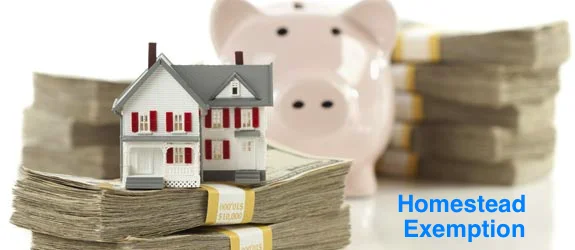


A homestead generally refers to the primary residence owned and occupied by a person or family. So, a homestead exemption is a legal provision designed to protect the value in a principal dwelling place. Thus, homestead exemptions can provide asset protection from creditors for at least some of the value in the homestead. Typically, no creditors with the exception of a mortgage holder, taxing agency or mechanic’s lien (liens placed by those who provided home improvement services, for example) may seize more of the equity than the homestead laws allow. PLEASE SCROLL DOWN FOR STATE-BY-STATE HOMESTEAD EXEMPTION TABLE A homestead exemption may also refer to statutes in some jurisdictions that offer property tax reductions for a primary residence. For example, as of this writing, Article VII, Section 6 of the Florida Constitution reduces the value of a home for assessment of property taxes by $50,000. It may also may refer to the protection provisions for spouses and children. In Florida, a married person must have consent of both spouses in order to sell a primary residence even of the property was paid for and is in the name of only one spouse. Upon death the surviving spouse can enjoy a life estate and use the home until passing. Alternatively, a widow may elect to timely file to take a 50% interest in the home and the remaining 50% is held in a life estate for the benefit of the decedent’s children. In particular, this article focuses on the amount of equity that one can protect from judgment creditors in each jurisdiction. We have people ask us all the time, “If someone sues you can they take your house?” The answer is yes unless you live in a state with sufficient homestead protection.

State, federal and territorial homestead exemption statutes vary. Some states, such as Florida, Iowa, Kansas, Oklahoma, South Dakota and Texas have provisions, if followed properly, allowing 100% of the equity to be protected. Other states, such as New Jersey and Pennsylvania do not offer any homestead protection. Whereas, the degree of protection in New York varies by county. What is more, with the 2005 federal bankruptcy code revision, residences purchased within 40 months (three years and four months) of a bankruptcy filing receive a maximum exemption of $125,000. In summary, there is great diversity in homestead protection state-by-state:
There are some notable variations among some US territories. American Samoa, for example, allows protection only for those of Samoan descent. Northern Mariana Islands allows one to keep the amount of land needed to support oneself. Puerto Rico requires a note to be certified by a notary public and filed with the Land Registrar.
Whether or not you can protect your home can be a major consideration when contemplating a bankruptcy filing. The majority of states and territories do allow some protection under their homestead exemption statutes. This exemption is a factor in both Chapter 7 liquidation bankruptcy as well as Chapter 13 where a payment plan can be arranged. So by knowing the rules, you may be able to protect some, most or all of your personal residence, and decrease the repayment amount in a Ch. 13 filing.
Please keep in mind that whereas we make every effort to keep the information up to date and accurate, that there are well over 50 states, districts and territories listed below and changes in regional and federal laws and rulings may occur before we have a chance to update the list. Additionally, some of the data on which we relied may, itself, be inaccurate or we may have misinterpreted our findings.
So, this may be used as a helpful reference, but you are responsible for confirming the accuracy of this information before relying upon it. In addition, there may be exceptions for child support, taxes, and/or acquiring real property with criminal proceeds. This exemption is one small part of an overall plan to protect assets from lawsuits. We encourage anyone who notices that an update needs to be made to fill out the contact form on this page and let us know.

Below you will find the amount of exemption allowed in your state or territory, the statutes applicable to the jurisdiction and some noteworthy points about the state or territory’s statutes and how they are interpreted. You will also see whether or not a particular state allows a doubling, or other increase, of the exemption for married couples. Where there is not an increase allowed the column is left blank. Again, laws change and we make no guarantees. So double check with a licensed attorney who specializes in this arena before relying on it.
On a related note, if you are married, you may want to know if you live in a tenancy by the entirety state. Do you live in a community property state where the debts of one spouse can jeopardize the assets of another? What about IRA creditor exemptions? Wage garnishment exemptions? All of these factor can help you determine the types of assets you need to protect.
Copyright Notice
And another thing. This page was a lot of work to put together. You can view it, link to it, tell others about it. But please don’t copy it. This website has a federally registered copyright and we would much rather meet you on the golf course than in the courtroom. See items that need to be updated? Let us know by completing the inquiry form on this page.
| ">State / Region | " data-sheets-numberformat="[null,4,""$"#,##0",1]">Homestead Exemption Amount | " data-sheets-numberformat="[null,4,""$"#,##0",1]">Married Couples / Joint Owners [1] | ">Homestead Exemption Statute and Notes |
| ">Alabama | " data-sheets-numberformat="[null,4,""$"#,##0",1]">$15,000 | " data-sheets-numberformat="[null,4,""$"#,##0",1]">$30,000 | ">Ala. Code § 6-10-2, 27-14-29. Real property or mobile home to $15,000; property cannot exceed 160 acres. |
| ">Alaska | " data-sheets-numberformat="[null,4,""$"#,##0",1]">$72,900 | ">Alaska Stat. § 09.38.010. Principal residence up to $72,900 (joint owners may each claim a portion, but total can’t exceed $72,900) | |
| ">Arizona | " data-sheets-numberformat="[null,4,""$"#,##0",1]">$400,000* | ">Ariz. Rev. Stat. § 33-1101A and the Predatory Debt Collection Protection Act, passed November of 2022, up to $400,000 of equity from creditors. *Increases with consumer price index annually, beginning in Jan 1, 2024. For real property, an apartment, or mobile home you occupy to; sale proceeds exempt 18 months after sale or until new home purchased, whichever occurs first | |
| ">Arkansas | " data-sheets-numberformat="[null,4,""$"#,##0",1]">Unlimited | ">Ark. Const. art. 4. For married person or head of family: unlimited exemption on real or personal property used as residence to 1/4 acre in city, town, or village, or 80 acres elsewhere; if property is between 1/4 to 1 acre in city, town, or village, or 80-160 acres elsewhere, additional limit is $2,500; homestead may not exceed 1 acre in city, town, or village, or 160 acres elsewhere. Not destroyed by death, divorce, or dependents’ emancipation | |
| ">California | " data-sheets-numberformat="[null,4,""$"#,##0",1]">$300,000 to $600,000 as of January 1, 2021 | " data-sheets-numberformat="[null,4,""$"#,##0",1]"> | "> |
As of January 1, 2021, Cal. Civ. Proc. Code §704.730 allows for a minimum homestead exemption of $300,000 and a maximum of the median sale price for a single-family home in the prior calendar year in the county in question to a maximum of $600,000. Furthermore, the amounts are to be indexed annually with inflation starting January 1, 2022, based on the California Consumer Price Index published by the Dept. of Industrial Relations. Therefore exemption amounts will be automatically updated by county without the need for another act of legislature. (So, for example if the median home price in San Francisco County is $1.4 million, the maximum homestead exemption in that county is $600,000. If the median home price in Modoc county is $134,854, the maximum homestead exemption in that county is $300,000.)